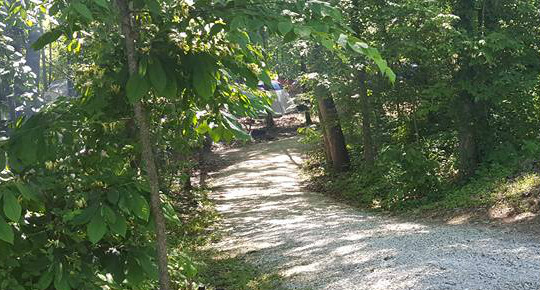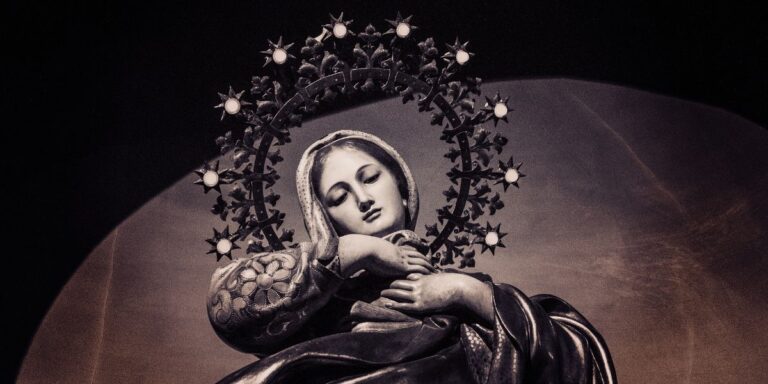One: The magical camping event is alive and well.
I’ve been an indoor conference presenter for the last decade. Getting out into the woods with magical folk put me back in touch with the tribal way of life.
Babalon Rising is a pan-Thelemic camping event. It’s held at Midian, a community owned event site in southern Indiana with 25 acres of forest in a reclaimed quarry. Campers pitch tents among the trees, share outdoor showers and porta-potties, and gather in the evening around an impressively massive campfire. The organizers are Midwest friendly and they have the logistics firmly in hand.
Everyone at Babalon Rising knew of at least one other camping event. Jason Mankey publishes a summer festival list every year. Here’s the 2016 list: Summer Pagan Festivals 2016: A Guide.
Two: Camping events build community.
Hotel conferences feel like a big party but it’s a different kind of party. It’s focused more on individual events than in bringing the whole crew together. When you’re camping next to other people who are also camping the edges bleed together – sharing and visiting are not only easier to do but required to make the event work. Then there’s the evening fire which pulls almost everyone out of their tents and into dancing and drumming community.
These events last! At ten years old Babalon Rising is a young event compared to Pagan Spirit Gathering at 35, Starwood at 36, and Pan-Pagan which is turning 40 this year. The secret to longevity: if people love the event they want to come back year after year. Everyone I met at Babalon Rising told me how many years they’ve been attending.
Three: Camping events are where the kids are.
Building community means including all ages. Hotel conferences feature a lot of gray hair and I feared that the Pagan community was leaning toward the older end of the spectrum. Nope! It isn’t that *Paganism* is aging, it’s that my peers and I aged out of camping. I was one of the older folk at Babalon Rising. Accounts from other outdoor festivals indicate a substantial youth-and-kid population. Camping events are where the newer generations hang out.
I slept in a nearby hotel, but I bought a camp chair and hung out all day.
Four: Witchcraft and Thelema are more than compatible.
I’ve been a practicing Witch and a practicing Thelemite for most of my adult life. I thought it was unusual to stick with both. I’ve met a number of people who tried Witchcraft and Thelema and went one way or the other, and I formed the impression that while the systems are compatible one will eventually pull you all the way in.
At Babalon Rising I met a number of Thelemic folk who are comfortable with Witchcraft in particular and Paganism in general. Witchcraft teaches how to carry the gods. These women and men merrily invoke Thelemic entities and carry them just like the God and Goddess of the Craft or any of the Pagan revival deities. This makes sense since Witchcraft and Thelema come from a common root, and I don’t mean Victorian esotericism. Our traditions stem directly from the Hellenistic religious world. The specific operations of theurgy, invoking deity into each other and ourselves, pass to our individual traditions in largely identical ways. Why shouldn’t we be able to work the traditions together?
Five: Ordo Templi Orientis is everywhere.
This year I was challenged by a scholar: “Brandy, when you say Thelema you mean O.T.O.” I recognized that this was an accurate call-out. So I was looking forward to meeting non-O.T.O. Thelemites at a consciously Pan-Thelemic event. At Babalon Rising I met dozens of people and when I asked each of them how they came to Thelema they would tell me their O.T.O. local group affiliation. Wait, are all you people O.T.O.? When I finally found a non-O.T.O. Thelemite I was so happy!
The event included three Gnostic Masses, all of which were conducted by O.T.O. members under O.T.O. guidelines. That was a surprise. The event was not sponsored by O.T.O. or bound by order policy, so they could have mounted Mass variants, but the organizers and Mass teams conscientiously presented the Mass as written.
The mission of O.T.O. centers on preserving Aleister Crowley’s work: keeping the books in print, sustaining the church Ecclesia Gnostica Catholica (now incorporated into O.T.O.) and maintaining the fraternity itself. Crowley left an outline for O.T.O. which we are diligently working to build out.
So if you’re going to explore Thelema you’re going to find O.T.O. You never have to join if it is not your will, but the rituals are there for you to engage in if you choose. You can attend Gnostic Mass, take initiations, enter into E.G.C. clergy. You can do this at the beginning of your magical journey, in the middle (like I did), or any time you are called to it. It’s the foundational Thelemic work and a baseline for Thelemic practice.
Six: Gender is increasingly irrelevant.
Young Thelemites, college-educated Thelemites, intersex and trans Thelemites have approached me with the question, why are the Mass roles gender-limited? Why can only men do the priest role and only women do the priestess role? I reply that I understand E.G.C. policy to encourage those who present in society as primarily female to act as priestess, and as male as priest, whatever the physical body. But why, they say, can’t we move fluidly between the roles? What’s the point?
Clergy in training sometimes choose to learn all the Mass roles, joining what one bishop calls the “all five club”. At Babalon Rising I met people who are engaged in a lively set of non-official Masses, not only swapping roles, but having all roles filled by women and all roles filled by men. They say the energy is really different. I’d love to see it!
As the Aeon of Osiris gives way to the New Aeon, limiting human capabilities to one of two cultural genders increasingly seems arbitrary. I suspect fifty years from now we’ll see a different set of policies. In the event the more experimental among us are already moving beyond gender-specific roles in private practice.
Seven: Thelema is growing and thriving.
At Babalon Rising I heard “Thelema is the religion that we are making.” There were priestesses and priests channeling Babalon, priestesses and priests channeling the Beast, a whole community of them! There was a ritual walk over fire, literally. There was a Qabbalah bar which was as much fun as it sounded. There was magic in the event itself – the festival has themed on the Sephiroth, starting with Malkuth, and this year was Kether, the crown. Babalon has risen!
There were so many new ideas. No one is waiting for permission, they’re jumping in and making it happen. This event strikes me as a marvelous incubator for New Aeon Thelema – it isn’t coming from a single genius who has memorized Crowley’s works, it’s coming from women, intersex and trans genders, Witches and Pagans, working together in groups, playing with new ideas until they crystallize into new forms.
Kether is the ending and the beginning. The crew promises to go on – possibly starting down the paths and theming on the Tarot trumps, giving another 22 years of magic. I was thrilled to be a part of it, and I can’t wait to go back.



